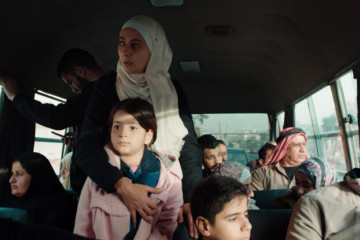

The inaugural Muslim International Film Festival (MIFF) came to an end on June 2 with the gala screening of Naqqash Khalid's directorial debut In Camera.
During the event, winners were announced for Best Film and Best Short.
Ten feature films were up for consideration and were judged by a festival jury.
The jury was made up of Claudia Yusef (Head of Development at BBC Films), Leon Oteng (Production Inclusion Manager at BFI Filmmaking Fund), Neila Butt (Creative Diversity Lead, Nations and Regions at Channel 4), Tas Brooker (filmmaker, When We Speak), Youssef Kerkour (BAFTA nominated actor for Channel 4’s Home).
In the competition were Khalid's sharp showbiz satire, Kamal Lazraq's Hounds, Selman Nacar's Hesitation Wound, Moin Hussain's Sky Peals, Mohamed Kordofani’s Goodbye Julia, Behrooz Karamizade’s Empty Nets, Mohamed Ben Attia's Behind the Mountain, and Amjad Al Rasheed's Inshallah A Boy.
Inshallah A Boy takes Best Film at MIFF
In the end, Inshallah A Boy was awarded Best Film.
The Jordanian drama about a newly widowed woman and her daughter facing eviction from their home because of patriarchal inheritance laws is a worthy winner.
It has earned similar acclaim at film festivals including Red Sea International, Bengaluru, Thessaloniki, and Cannes – the first Jordanian film to ever be invited to premiere on the Croisette – as well as the Asia Pacific Screen Awards.
Al Rasheed said he was honoured to collect the award at Odeon Luxe Leicester Square on Sunday night and is one of the X feature directorial debuts screened during the festival.
This above-average number highlights MIFF's commitment to showcasing the filmmaking prowess of emerging talent from the Muslim world and/or filmmakers writing about it.
Yet, the absence of female directors in this curated selection seems a rather glaring oversight, especially considering the inclusion of a few standout features centred on female perspectives.
Women's journeys in Muslim cinema
As well as Inshallah A Boy, Kordofani’s Goodbye Julia is a powerfully intimate portrait of two Sudanese women and the racism, ethnocentrism and religious differences that compounded the political, social and economic tensions leading to the secession of Southern Sudan in 2011.
Given current events, Goodbye Julia is a sensitive and nuanced entry point into the Sudanese conflict that has claimed far too many lives and displaced far too many people.
By centring women (played evocatively by Eiman Yousif and Siran Riak), as with Inshallah A Boy, these films also expose how often patriarchal structures are weaponised to suppress, subordinate and oppress the female populace.
The winner of Best Short similarly highlights this struggle. Yellow, written, directed by, and starring Elham Elhas, tells the story of a young Afghan woman, played by Afsaneh Dehrouyeh, as she buys her first chadari (full-body veil) in Taliban-controlled Afghanistan.
While the film maintains a light, playful touch, the oppressive nature of the militant regime is always looming beneath the surface.
Elsewhere, Asena Nour's See You In The Dark – one of the few shorts written and directed by a woman – grapples with the ominous threat of an Internet troll as a London-based artist seeks to confront the man who sexually assaulted her on the opening night of her exhibition.
Steeped in rage and pain, the semi-autobiographical film is a potent and personal examination of the casual infliction of misogyny and rape culture on women.
It's a strong example of how the festival is willing to challenge and expand our understanding of stories from the Muslim world.
Empowering diverse voices through cinema
The programme is not simply seeking to pedestal Muslims and put them in an uncritical spotlight; rather it wants to showcase the diversity of human experiences that exist within the Muslim faith and champion those who come from it to tell big-screen stories.
“I have been lucky to travel, collaborate with the most extraordinary people, create work which I hope will stand the test of time, films which have moved and engaged with people around the world," said British filmmaker Asif Kapadia as he collected the Trailblazer award.
Outsiders have been a recurring theme in the award-winning writer-director's work, which includes The Warrior, Senna, Amy, and Maradona.
"Those who may not conform or fit into the power systems around them," he added.
"Becoming a film director, a writer, producer or indeed working on the crew in the film industry, isn’t an obvious or simple choice for someone born in Hackney to working-class British Indian Muslim parents during the 70s. But I feel lucky that I found filmmaking – it changed my life."
Cinema certainly has the power to change lives and perspectives and MIFF has been a golden opportunity to recalibrate the celluloid image of Muslims after decades of Western marginalisation.
With submissions already open for the second instalment of the festival next year, here's hoping it makes more space for female filmmakers to showcase their feature-length efforts to reflect the vastness of Muslim communities and cultures – and give London audiences an even better chance to empathise with them.
Hanna Flint is a film and TV critic, writer and author of Strong Female Character with bylines at Empire, Time Out, Elle, Town & Country, the Guardian, BBC Culture and IGN
Follow her here: @HannaFlint



 Follow the Middle East's top stories in English at The New Arab on Google News
Follow the Middle East's top stories in English at The New Arab on Google News


